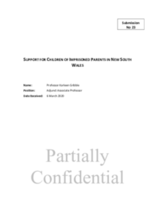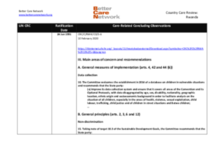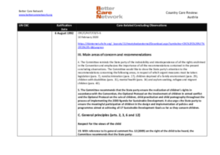Displaying 161 - 170 of 947
In this Submission to the Inquiry into Support for Children of Imprisoned Parents, Karleen Gribble, Adjunct Associate Professor in the School of Nursing and Midwifery at Western Sydney University, comments on "the situation of infants and young children whose mothers are incarcerated and the support or undermining of their health and wellbeing in the justice system."
The primary aim of this chapter is to outline the significance of trauma in the lives of parents involved in the child protection system who are sent for forensic psychological evaluations.
This independent evaluation found that the Pause Programme - which supports local practices to deliver relationship-based support to women who have experienced removal of at least one child and are judged to be at risk of further removals of children - is effective in making a positive difference in women’s lives, improving their relationships with children, reducing rates of infant care entry in local areas and delivering cost savings for local areas.
The aims of this article were to identify the types and characteristics of social support for families in vulnerable situations and to analyze what elements influence families’ attitudes towards these supports.
This study describes the community-based needs of parents with psychiatric disabilities who experienced legal challenges to their parenting rights.
There is limited understanding related to the role of community‐based centres in reducing social exclusion and isolation, so the aim of this research was to explore the role one family centre had in improving social inclusion in a deprived community in Glasgow, Scotland.
The purpose of the present study was to examine differences in both internalized (e.g., worry and guilt) and externalized (e.g., anger and resentment) caregiver strain among biological, foster and adoptive caregivers, and assess the degree to which characteristics of the caregivers and the children in their care impact strain.
This study aimed to evaluate the effectiveness of the Happy Parenting: Round-the-Clock Parenting (HPRCP) program for Macau parents on shift work, using randomized controlled trial design.
This Country Care Review includes the care-related concluding observations adopted by the Committee on the Rights of the Child and the Committee on the Rights of Persons with Disabilities, as well as other care-related concluding observations, ratification dates, and links to the Universal Periodic Review and Hague Intercountry Adoption Country Profile.
This country care review includes the care related Concluding Observations adopted by the Committee on the Rights of Persons with Disabilities and the Committee on the Rights of the Child.




